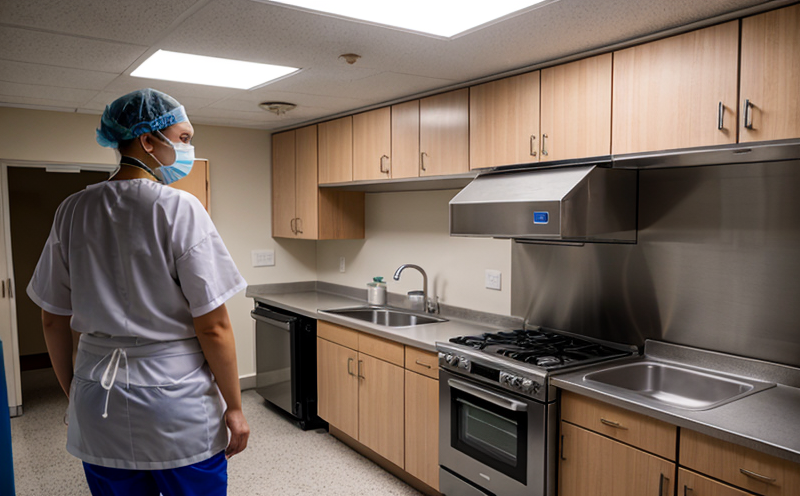Hospital kitchen inspection
The hospital kitchen inspection is a critical component of ensuring food safety and hygiene in healthcare settings. The primary goal of this inspection is to verify that all food-handling processes comply with stringent standards set by international bodies such as the World Health Organization (WHO) and local health regulatory authorities.
During a typical hospital kitchen inspection, several key areas are evaluated:
- Cooking temperatures: Ensuring that food is cooked to safe internal temperatures prevents the growth of harmful bacteria. For example, poultry should reach at least 74°C (165°F) and ground meat should be heated to 62.8°C (145°F).
- Storage conditions: Refrigeration units must maintain a temperature below 4°C (40°F), while hot holding areas need to keep temperatures at or above 60°C (140°F). Proper storage minimizes the risk of foodborne illnesses.
- Cleaning and sanitation practices: Inspectors check that surfaces, equipment, and utensils are cleaned regularly using approved disinfectants. Handwashing facilities must be accessible to all kitchen staff and meet specific design criteria.
- Personal hygiene: Staff should wear clean uniforms, hairnets, and gloves when handling food. Regular handwashing is mandatory before starting work and after certain tasks.
- Pest control: The presence of pests or signs of infestation can indicate poor sanitation practices and potential contamination risks.
The inspection process also involves verifying that all staff are trained in proper food handling techniques. This includes understanding cross-contamination prevention, allergen management, and the safe use of allergens in separate areas to avoid accidental exposure.
Accredited laboratories play a crucial role in supporting these inspections by providing independent third-party verification through microbiological testing. Compliance with international standards such as ISO 22000:2018 ensures that food safety management systems are effectively implemented and maintained.
Why It Matters
The importance of hospital kitchen inspections cannot be overstated, especially given the sensitive nature of healthcare environments. Patients in hospitals are often immunocompromised, making them more susceptible to foodborne illnesses. A single outbreak can have severe consequences for patient health and well-being.
Regular inspections help identify potential hazards early on, allowing for timely corrective actions before incidents occur. This proactive approach enhances the overall safety of meals served within hospital settings and contributes positively to public trust in healthcare facilities.
In addition to safeguarding patients, ensuring proper kitchen operations also protects staff from foodborne illnesses. Proper training and adherence to sanitation protocols minimize risks associated with cross-contamination and improper handling practices.
From a broader perspective, maintaining high standards of food safety contributes significantly to the reputation of healthcare providers. Hospitals that prioritize food safety demonstrate their commitment to patient care and quality assurance, which is essential for attracting and retaining patients.
Customer Impact and Satisfaction
Ensuring that hospital kitchens meet rigorous inspection criteria directly impacts customer satisfaction and loyalty among healthcare providers. Satisfied customers are more likely to recommend services and return for future visits, contributing positively to overall patient experience scores.
A clean and well-maintained kitchen environment fosters a sense of trust between patients and staff. When individuals feel confident about the cleanliness and safety measures in place, they are more inclined to eat hospital-provided meals without hesitation.
Moreover, inspections that lead to identified improvements can result in enhanced operational efficiency within kitchens. Efficient operations translate into reduced costs for procurement and labor, ultimately benefiting both the facility and its patrons.
International Acceptance and Recognition
- ISO 9001:2015: This standard ensures that quality management systems are implemented effectively in healthcare facilities, including kitchen operations.
- IEC 62304: Pertains to software used in medical devices, which can include automated food safety monitoring systems within hospital kitchens.
- EN ISO 17025:2017: This standard applies to laboratories and inspection bodies engaged in testing, calibration, and other types of measurement services related to food safety analysis.
- ASTM E368-14: Offers guidance on the design, operation, performance evaluation, and improvement of medical device software intended for use within healthcare settings like hospital kitchens.
These international standards provide a framework that ensures consistency across different countries and regions. By adhering to these guidelines, hospitals can demonstrate their commitment to maintaining high standards in food safety practices, thereby gaining recognition from regulatory bodies and enhancing trust among stakeholders.





